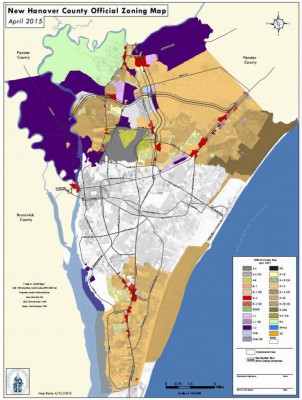WILMINGTON – A proposal to modify New Hanover County’s special-use permit process would more rigorously review heavy industry wanting to move into the area.
Businesses identified as heavy or intense manufacturing operations that may affect groundwater, air quality, wetlands and endangered species and require state and federal permits would immediately trigger a “project-assessment report” under permit changes proposed by a project team of local leaders and business representatives.
Supporter Spotlight

“New Hanover County is the second smallest county in the state out of the 100 counties and it’s the third most densely populated,” said Karen Dunn, Clean Communities Coordinator with the N.C. Coastal Federation. “These are the kinds of things that factor into making decisions about heavy industry.”
The project team has spent the past year and about 1,300 hours focusing on how to make the special-use permitting process more concise, further vet heavy industry and lure businesses to the county. Team members include leaders representing the county’s beach towns and the city of Wilmington, chamber of commerce members, large employers including General Electric, Wilmington International Airport officials and homebuilders.
The team identified more than 17 heavy industries, including those that produce paper, chemicals, concrete, fertilizer and petroleum products such as oil refining, that would require a project-assessment report. The process would take an estimated 90 days to complete.
“This is something that’s way overdue,” said Mike Giles, coastal advocate with the federation’s Wrightsville Beach office. “This could be a tool that helps guide the growth on how our county grows in the next 50 years.”

While it is the intention of cement manufacturer Titan American to open a plant in Castle Hayne that sparked the federation to spearhead a study of the special-use permit, the review and subsequently proposed changes the team has sent to the county are not aimed at a particular industry, Giles said.
Supporter Spotlight
The federation along with Cape Fear River Watch, PenderWatch and Conservancy and the Sierra Club have challenged the N.C. Division of Air Quality’s air permit for proposed cement plant, which would emit more than 5,000 tons of air pollution each year.
Superior and administrative courts have both ruled in favor of the state, which argues that residents living near the proposed plan do not have a right to challenge the agency’s permitting decision.
The Southern Environmental Law Center has taken the case to the N.C. Court of Appeals.
“We’ve asked the court to hear oral arguments on the case,” said Geoff Gisler, the law center’s senior attorney. “If they do then we expect that the case will be argued this spring or early summer. If they don’t grant arguments, I’m hoping we’ll have a decision sooner than that.”

The proposed plant would include a cement kiln capable of producing 2.4 million tons of cement each year and an adjacent limestone quarry. The quarry would destroy more than 1,000 acres of wetlands, according to the law center.
Titan is in the process of obtaining several other permits for the proposed plant. The company is also developing an environmental impact statement.
A Titan spokesperson did not respond to calls or an email requesting comment.
Industry that has this type of potential environmental and human-health impact deserves a more thorough review on the local level, Giles said.
With money from a $25,000 grant from the Lillian Goldman Charitable Trust, the federation hired a private consultant to review heavy industrial zoning and look at special-use permitting processes in other coastal communities.
The end result includes the recommendation that New Hanover County implement a pre-application process for general special-use permit applicants. This process sets the stage for the applicant, which would have to discuss any and all potential effects, including those to the environment and public health.
“Some critics might say it’s just another step,” Dunn said. “It’s a critical step because it lays everything out. The developer is going to know pretty much exactly what needs to be done and general time frames.”

Project-assessment reports would be exclusively for heavy and intensive industry. Under the suggested changes, a heavy and intensive manufacturer would be required to host a community information meeting before the county planning board reviews the permit application.
“This is to let the community know exactly what’s being proposed,” Dunn said. “It can be an advantage also for the developer because, lots of times, property owners who have been in the area for decades that know more about the land around the area can contribute valuable information to the developer.”
Under the current special-use permitting process adopted in 2011, manufacturers that develop within the county’s I-2, heavy industrial, zone may do so by right. Those industries that want to build within the I-2 zone and require a special-use permit must submit a “non-binding narrative” with the application that discloses projected external effects and any federal and state permits that would be required.
The project team’s proposed modifications clear up where industries can be developed by right, Dunn said.
New Hanover County officials have in recent years sought to make changes to the current permit rules. In 2014, the county, chamber of commerce and planning board drafted a series of additional text amendments. County commissioners ultimately voted down the amendments.
It is unclear whether commissioners will take the project team’s recommendations to a vote.
New Hanover County Planning Director Chris O’Keefe attended team meetings and advised members to keep clarity and simplicity in mind when drafting changes.
“We haven’t come up with any kind of recommendations,” he said of the county planning department.
The draft model permit has been submitted to county manager Chris Coudriet.
Ruth Smith, the county’s chief communications officer, said the county manager will review the draft model but that it is “not on the front burner today.”
Giles said he hopes Coudriet will soon meet with members of the project team to discuss any issues and concerns about the proposed changes.
“Is the model ordinance we’ve proposed perfect? Probably not,” he said. “That’s why we need to sit down with project team members and the county manager and get this thing worked out. We need to get this moving forward.”







